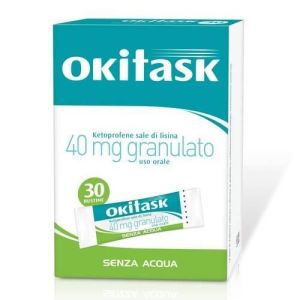Ship in Europe, Find out rates!
Okitask 40 mg Ketoprofen Lysine Salt 30 Sachets

- box Delivery in Italy in 24/48 and free returns
- star3.000+ positive reviews
- dropboxOver 60,000 products in the catalog
Okitask 40 mg granules is an anti-inflammatory drug based on Ketoprofen salt of Lysine .
Therapeutic indications
Okitask is used in the treatment of pains of different origins and nature, and in particular: headache, toothache, neuralgia, menstrual pain, muscle and bone pain.
Dosage and Posology
Okitask is administered orally, according to the following doses:
- Adults and children over 15 years: 1 sachet, in a single dose, or repeated 2-3 times a day, in the painful forms of greater intensity.
The contents of the sachet can be placed directly on the tongue. It dissolves with saliva: this allows it to be used without water. It is preferable to take the product on a full stomach . Do not exceed the recommended doses: in particular elderly patients should follow the minimum dosages indicated above. The duration of the therapy must be limited to the overcoming of the painful episode.
Overdose
Cases of overdose have been reported with doses up to 2.5 g of ketoprofen. In most cases, benign symptoms were observed and limited to: lethargy, drowsiness, headache, dizziness, confusion and loss of consciousness, as well as pain, nausea, vomiting and epigastric pain. Gastrointestinal bleeding, hypotension, respiratory depression and cyanosis may also occur. There is no specific antidote to ketoprofen overdose. In cases of suspected massive overdose, gastric lavage is recommended and symptomatic and supportive treatment instituted to compensate for dehydration, monitor urinary excretion and correct acidosis, if present. In cases of kidney failure, hemodialysis can be helpful in removing the drug from the bloodstream. In case of accidental ingestion / intake of an excessive dose of OKITASK 40 mg granules, notify your doctor immediately or go to the nearest hospital.
Contraindications
- Patients with a history of hypersensitivity reactions such as bronchospasm, asthma attacks, acute rhinitis, hives, skin rashes or other allergic-type reactions to ketoprofen, or substances with a similar mechanism of action (e.g. acetylsalicylic acid or other NSAIDs).
- Serious, rarely fatal, anaphylactic reactions have been observed in these patients (see section 4.8).
- Patients with hypersensitivity to any of the excipients;
- Third trimester of pregnancy, known or suspected pregnancy, during lactation (see section 4.6 - pregnancy and lactation) and in children under 15 years;
- Severe heart failure
- Patients with gastric or duodenal ulcer, gastritis and chronic dyspepsia;
- Subjects with leukopenia or thrombocytopenia, with ongoing bleeding or haemorrhagic diathesis, undergoing treatment with anticoagulants;
- Patients with severe renal or hepatic insufficiency;
- Patients undergoing major surgery.
- Furthermore, simultaneous administration with other anti-inflammatory drugs and acetylsalicylic acid is not recommended.
- Active peptic ulcer / haemorrhage or history of recurrent peptic ulcer / haemorrhage (two or more distinct episodes of proven ulceration or haemorrhage).
- Previous history of gastrointestinal bleeding, ulceration or perforation related to previous NSAID treatment.
Side effects
Like all medicines, OKITASK 40 mg granules can cause side effects, although not everybody gets them. The most commonly observed adverse events are gastrointestinal in nature. Peptic ulcers, gastrointestinal perforation or bleeding, sometimes fatal, may occur, particularly in the elderly (see Important to know). The frequency and extent of these effects are significantly reduced by taking the drug on a full stomach. In exceptional cases, the manifestations of hypersensitivity can take the character of severe systemic reactions (edema of the larynx, edema of the glottis, dyspnoea, palpitation) up to anaphylactic shock. In these cases, immediate medical assistance is required.
Pregnancy and breastfeeding
- Pregnancy
Inhibition of prostaglandin synthesis can adversely affect pregnancy and / or embryo / fetal development. Results of epidemiological studies suggest an increased risk of miscarriage and cardiac malformation and gastroschisis after use of a prostaglandin synthesis inhibitor in early pregnancy. The absolute risk of cardiac malformations increased from less than 1% to approximately 1.5%. The risk was believed to increase with dose and duration of therapy.
In animals, administration of prostaglandin synthesis inhibitors has been shown to cause increased pre- and post-implantation loss and embryo-fetal mortality. Furthermore, an increased incidence of various malformations, including cardiovascular, has been reported in animals given prostaglandin synthesis inhibitors during the organogenetic period.
Therefore ketoprofen should not be administered during the first and second trimester of pregnancy unless strictly necessary. If ketoprofen is used by a woman conceiving, or during the first and second trimester of pregnancy, the dosage should be kept as low as possible for the shortest possible duration of treatment. During the third trimester of pregnancy, all prostaglandin synthesis inhibitors can expose the fetus to:
- cardiopulmonary toxicity (with premature closure of the arterial duct and pulmonary hypertension);
- renal dysfunction, which can progress to renal failure with oligo-hydroamnios; the mother and the newborn, at the end of pregnancy, to:
- possible prolongation of bleeding time, and antiplatelet effect which may occur even at very low doses;
- inhibition of uterine contractions resulting in delayed or prolonged labor.
Consequently, ketoprofen is contraindicated during the third trimester of pregnancy.
- Feeding time
There is no information available on the excretion of ketoprofen in human milk. Ketoprofen is contraindicated during breastfeeding.
Special warnings
Undesirable effects can be minimized with the use of the lowest effective dose for the shortest possible duration of treatment needed to control symptoms (see sections below on gastrointestinal and cardiovascular health). Caution should be exercised in patients taking concomitant medications that could increase the risk of ulceration or bleeding, such as oral corticosteroids, anticoagulants such as warfarin, selective serotonin reuptake inhibitors or antiplatelet agents such as aspirin (see section 4.5. other forms of interaction).
Concomitant use of OKITASK 40 mg granules with other NSAIDs, including selective cyclooxygenase-2 inhibitors, should be avoided Gastrointestinal haemorrhage, ulceration and perforation: during treatment with all NSAIDs, at any time, with or without symptoms of warning or previous history of serious gastrointestinal events, gastrointestinal bleeding, ulceration and perforation, which can be fatal, have been reported.
In the elderly and in patients with a history of ulcer, particularly if complicated with haemorrhage or perforation, the risk of gastrointestinal bleeding, ulceration or perforation is higher with increased doses of NSAIDs. These patients should start treatment with the lowest possible dose. Concomitant use of protective agents (misoprostol or proton pump inhibitors) should be considered for these patients and also for patients taking concomitantly low dose aspirin or other drugs that may increase the risk of gastrointestinal events (see below and section 4.5 interactions with other medications and other forms of interactions).
Patients with a history of gastrointestinal toxicity, especially when elderly, should report any abdominal symptoms (especially gastrointestinal bleeding) particularly in the initial stages of treatment. Elderly: Elderly patients have an increased frequency of adverse reactions to NSAIDs, especially gastrointestinal bleeding and perforation, which can be fatal. When gastrointestinal bleeding or ulceration occurs in patients taking OKITASK 40 mg granules the treatment should be discontinued.
Serious skin reactions, some of them fatal, including exfoliative dermatitis, Stevens-Johnson syndrome and toxic epidermal necrolysis, have been reported very rarely in association with the use of NSAIDs (see section 4.8). In the early stages of therapy, patients appear to be at higher risk: the onset of the reaction occurs in most cases within the first month of treatment. OKITASK 40 mg granules should be discontinued at the first appearance of skin rash, mucosal lesions or any other signs of hypersensitivity.
Clinical studies and epidemiological data suggest that the use of some NSAIDs (especially at high doses and for long-term treatment) may be associated with an increased risk of arterial thrombotic events (e.g. myocardial infarction or stroke). There are currently insufficient data to exclude a similar risk for ketoprofen when it is administered as a daily dose of one sachet, as a single dose, or repeated 2-3 times a day.
OKITASK 40 mg granules contains aspartame as a sweetener: this substance is contraindicated in subjects suffering from phenylketonuria. OKITASK 40 mg granules does not affect low-calorie or controlled diets and can also be administered to diabetic patients.
Expiration and retention
Check the expiration date indicated on the package. The expiry date indicated on the package refers to the product in intact packaging, correctly stored.
Warning : do not use the medicine after the expiry date indicated on the package.
Composition
The composition of one sachet of Okitask 40 mg Granules is:
Active principle
Ketoprofen lysine salt 40 mg (corresponding to 25 mg of ketoprofen).
Excipients
Povidone, colloidal silica, hydroxypropylmethylcellulose, eudragit EPO, sodium dodecyl sulfate, stearic acid, magnesium stearate, aspartame, mannitol, xylitol, talc, lime flavor, lemon flavor, fresh flavor.
| Destination | Cost | Detail |
|---|---|---|
| Italy | €5,90* | 24/72H |
| Austria, France, Germany, Slovenia | € 13* | 3 days |
| Belgium, Luxembourg, Portugal, Netherlands, Spain | € 14* | 4 days |
| Bulgary, Cechia, Hungary, Poland, Romania, Slovakia | € 19* | 5 days |
| Denmark, Estonia, Finland, Ireland, Lithuania, Latvia ,Sweden | € 22* | 5 days |
| United Kingdom, Switzerland, Greece, Malta/td> | € 30* | 7 days |
| Canada | € 40 | 7 Days |
European shipments with express courier: FedEx, MBE, DHL
*For the shipment outside band B ther's an extra cost of 22€ *For the shipment outside band C ther's an extra cost of 30€ Delivery Times exclude Saturday and Holidays
For Islands and Areas of difficult Accessibility the shipments are made in 72 hours and the cost will be increased by 15€


